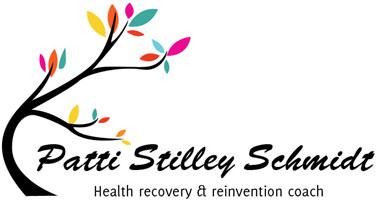
By Patti Schmidt
Health coach and consultant
During the 30 years I’ve been chronically ill, my health has been up and it’s been down. I’ve learned how to make it more likely that I’ll be up, though, by being good to my body, hoping it would return the favor. Maybe some of the things I tried will help you recover, too. They include:
- Remove yourself from exposure. Medical treatment begins with confirming presence of the potential for exposure; removal from exposure; collection of a database and performance of differential diagnosis. Be sure to work with medical professionals who know what they’re doing and who provide empirical data to show illness parameters as well as laboratory results documenting improvement.
- Attitude: Even when I wasn’t winning, I counter-attacked every chance I could. I knew I’d eventually win the war. I imagined my immune system’s soldiers going to battle in my bloodstream, vanquishing viruses and shoring up cells. It feels surprisingly good. Don’t just lie there; fight back. Believe you’ll get better with time.
- Rest: This was a tough one for me at first and, in the beginning, guilt consumed me because I was doing a lot of nothing. But then I realized that it was my job to get better. When I decided to be as good at resting as I was at being a newspaper editor, resting got easier. I slept when I needed to and lazed around and didn’t do a darned thing. Do what you need to do to get better. No excuses. When necessary, make recuperating your fulltime job.
- Diet: Reluctantly, I cut fat and sugar from my diet. I subscribed to Vegetarian Times and reluctantly developed an affinity for fresh vegetables. I bought a juicer and used it regularly. I cut back on caffeine. I began to see what I ate as the ultimate medicine; it didn’t make sense to eat junk food when my body truly needed good things. I didn’t worry about gaining a few pounds, either; I worried instead about getting better. Feed your body only good things.
- Knowledge: When I had some energy, I added my reporting skills to my arsenal. For an hour or so each day, I investigated my illnesses. I read every book on these topics in the library and consulted experts. I read up on Internet forums and talked with fellow sufferers. I learned all about viruses; how research is funded and accomplished; how lobbyists obtain funding. When I didn’t know what something meant, I looked it up in a medical dictionary or called my doctor. Talking with others involved in the battle is heartening and enlightening. Knowledge is power; learn about your illnesses.
- Exercise: When you can, exercise. Check with your physician first and follow your body’s signals. A walk around the block was about all I could do at first. When you’re up to it, add more. Any kind of moving is better than none. For those of us with major problems with adequate oxygen delivery into muscles (and this is usually the case in mold patients), even trying a little exercise ends up being a bad idea. If you’re having a better day than usual, and you go for a walk, be sure to write down if you’re slammed the next day. If you don’t deliver oxygen well, protein burning will result, making you feel bad. If you crash the day after you pushed yourself, then you did too much. Keep your body supple with some form of regular stretching or exercise and figure out how to push the envelope without relapsing.
- Maintain relationships: Too tired to do research? Join a support group and people there will tell you what’s going on. If you’re too tired to go to support group meetings, start a “phone group” and telephone a few other patients every few days. Don’t forget that you’re still part of the world out there. Stay in touch with others.
(Note: I’ll soon be adding telephone support groups of up to 8 people each to my practice. Email me at patti@ pattischmidtcoaching.com if you’re interested in participating in such a group.)
- Ask for help when you need it. Living with chronic illness is difficult, and it’s so much easier when you have a team of knowledgable professionals, friends and fellow sufferers you can count on to offer that ever-so-crucial support that allows you to maintain hope.
A few caveats: what worked for me may not work for you. Don’t self-diagnose or self-medicate. Only a trained professional should evaluate what’s best for you. Talk with your doctor before you try anything new.
I don’t know about you, but I feel better with a plan of attack. If you need help putting your plan of attack together, I can help.
Patti Stilley Schmidt is a health coach, counselor and consultant. She’s a chronic illness survivor, with years of experience managing, researching and advocating to improve the lives of the chronically ill, especially those with stigmatized illnesses. She’s been a peer counselor, support group leader, national advocacy organization board member, and has written dozens of articles on these topics, along with the book Mold Warriors with Dr. Ritchie Shoemaker. She is finishing up a Master’s degree in Clinical and Counseling Psychology at Chestnut Hill College in Philadelphia.
